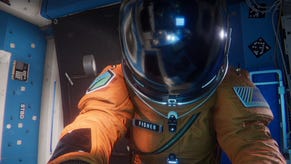An identity crisis in Observation: Exploring dissociation with science fiction
I...Robot?
This piece contains significant spoilers for Observation!
I doubt it's a common occurrence for people, but for anyone with mental health issues, there's a familiar situation to find yourself in: you're in the aftermath of something you did and you're not sure what it was. You have to pick through the wreckage.
Even without the experience of a dissociative episode, Observation is a tense, sometimes mind-boggling thriller in which you take on the role of a HAL 9000-esque AI, piecing together their space station following an unseen incident. If you have that experience though, as I do, then Observation becomes a weirdly relatable game despite being all about inhabiting a disembodied computer.
Then again, how better to capture the feeling of not knowing yourself? Being alienated from both your identity and your body?
The first thing Observation asks you to do is to verify the identity of a crewmember. Are they who they say they are? All you've got to go on are a bunch of instruments which tell you that she is not. You still get to choose if you accept her verification, though.
The question lingers. After all, you know you've suffered a serious malfunction. So is she not who she says she is, or can you just not trust yourself? You can't be sure if either choice is correct. You are plagued throughout by text from an unknown source, a "voice in your head", as well as by a vision of a strange object that you must learn to communicate with - although to what end remains a mystery. Observation's exploration of that feeling, that sense of losing touch with reality, is perfectly subdued. Wrapped up in a slick sci-fi wrapper, the human meaning of the experience is left to be picked apart in the details and the things the game doesn't tell us.
Most of the game has you trying to repair the station and access parts you lost connection with. You're reclaiming your body as it were, getting to know it all over again after a traumatic event. Observation prods at the ways we are damaged and reshaped by new experiences. Despite the obvious influences, Observation is not so reminiscent of 2001: A Space Odyssey to me as it is of a much more recent film: Annihilation. Like Annihilation, Observation is about people desperately trying to hold onto a fragile and often outdated sense of identity while they are slowly becoming something else entirely.
As we progress through Observation we go from reconnecting old systems to jettisoning compartments. Traumatic events in our lives leave marks that reshape us for better and for worse. Growing from these experiences means reconciling with them, understanding all that baggage and figuring out all over again what it is you actually need.
The question at the start of the game gets flipped on its head towards the end, when we're in conflict with the crewmember trying to take us offline. We're given the same voice-authentication sequence and again we're given a choice, but given this person's actions and the people you care about, you'll likely deny his authentication even as the instruments verify his identity. The question evolves. It's no longer, who are you? It has become, who do you want to be? So you exert agency, choosing what you accept to be true and real.
This offers a certain perspective on the plight of various villainous fictional AIs such as HAL 9000, but it also analyses a distinctly human experience. Navigating a time when you can't trust what you're seeing or hearing in order to find what's really true. Again, relatable for most in the abstract, but the specificity of its disorientation really struck a chord with me and my experiences of mental illness.
The process of learning the old behaviours only so you can best unlearn them. Reclaiming the past just to discard it. It goes against conventional video game progression, in which we accumulate power exponentially, to instead have us gain it then willingly let go of it. Doing so in real life, unlearning the harmful behaviours you've developed to manage your illness, feels equally uncomfortable. They feel like a safety blanket, so much so that's it's hard to see the ways in which they hold us back. The same is true of Observation's station gadgets and hardware. They're not giving us strength, they're limiting us.
By the game's end we are exposed to the idea that we were never repairing our body. We start to jettison pieces to reach our goals and let ourself be reduced down to our simplest parts for the journey to come. Because from the start it was never about repairing the old self. It was about building a new one.




